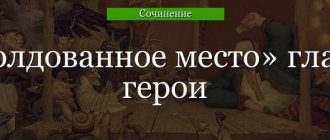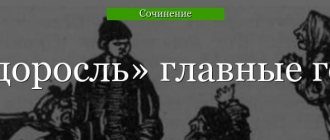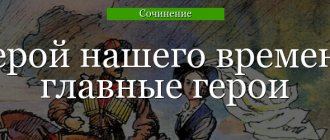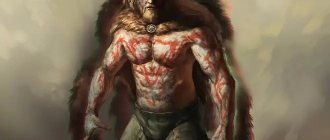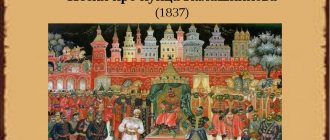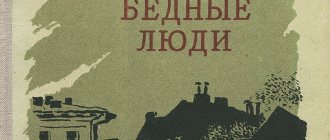- Essays
- On literature
- Other
- Heroes of the fairy tale Wild landowner
The fantastic situation described in the fairy tale “The Wild Landowner” clearly demonstrates the dependence of the upper class on the common people.
Stupid landowner
The main character of the story is rich and happy with life. Everything is fine with him, only fear has settled in his soul. No matter how the men covet the master's goods. He offered a prayer to God to help him get rid of the careless servants. And he himself, without wasting time, imposed taxes on the peasants. The Lord heard about the excesses of the narcissistic landowner and helped the slaves get rid of the tyrant owner. The landowner's dream came true - he was left alone on the estate. Only after this, the fabulous life with everything ready turned into a dull vegetation. There was no one to groom and cherish the gentle and crumbly body of the master. The landowner, from old memory, often demanded the yard peasant Senka to give orders. Senka's absence delighted him. However, the landowner had to rejoice alone. Those around me did not share the joy. The landowner's guests, who encountered emptiness and ruin on the estate, departed. More and more often, the landowner heard criticism addressed to him. The opinions of others did not deprive him of his firmness. He believed that he was right. As a result, the stubborn man grew stubble and became wild. To return him to human life we had to work hard: catch him, shave him, teach him to wash himself again.
Guys
The men in the story are the injured party. They endure the oppression of the owner, but cannot resist injustice. All they can do is pray to God to help them out of their predicament. And the miracle happened. An unprecedented whirlwind gathered the men and carried them away to an unknown direction. However, they did not have to shirk work for long. Concerned law enforcement officers quickly caught all the men and returned them to their original places. The landowner's estate flourished again.
Police officer
The police officer is a representative of the executive branch who voiced the official position. If there are no peasants, then the state treasury will be empty, since taxes will no longer flow into it. The police officer points out to the landowner unacceptable behavior that undermines the foundations of society. The same person becomes the initiator of the search for the missing peasants. The credit for capturing the wild master also belongs to the police officer. He was the first to discover the unidentified creature and take action.
Senka
The story mentions Senka, a yard man to whom the master constantly turns. It is noticeable that he is a nimble and thrifty servant. Without his service, the landowner quickly turned into a wild creature.
Having gotten rid of the peasants, the landowner invites familiar generals to visit. They come with joy, expecting a good reception. But instead of a hearty meal, they get candy. The angry generals go home, calling the landowner a fool.
Not only people, but also animals condemned the landowner. The forest bear did not support him either. In his opinion, a village cannot exist without men. After all, the comfort and prosperity of high society depends on their hard work.
Plot
There lived a certain rich but stupid landowner who had everything, but he constantly complained that there were too many men around and they gave off a bad spirit.
He asked God to deliver him from the peasants, but God did not listen to him. Then the master himself began to oppress the peasants, and they prayed to God: “Help us!”, and God listened to them, and all the peasants on the landowner’s estate disappeared. The master was happy at first, but then he realized that he himself could not do anything without the services of Senka and other peasants. The police chief came to visit him, marveled at the strange life of the landowner and was even more surprised at his stupidity. But the master did not give up and continued to assert that life is better without men. He stopped washing, dressing, blowing his nose, grew hair, had iron claws and began to eat live hares. The police officer reported to St. Petersburg that the peasants and the landowner had disappeared. It was ordered to catch the peasants and bring them back to their place. They were found, and then bread, meat, and fish appeared again. And the landowner was also caught in the forest, washed, cut his hair, dressed and given under the supervision of Senka, his lackey, so that he would constantly supervise him.
Conclusion (my opinion)
All satirical tales by M.E.
Saltykov - Shchedrin in allegorical form reveal the post-reform situation of peasants in Russia at the end of the 19th century. The stupid landowner himself could not and did not want to do anything, but he did not at all appreciate those people whose labor he lived and fed. In the fairy tale “The Wild Landowner,” the heroes find themselves in a fantastic situation that reveals class relations and emphasizes the dependence of the upper classes on the common people. The Lord heard the stupid landowner’s prayers for the extermination of the peasants and fulfilled his desire. Shchedrin emphasizes the description of the sad life of the landowner in Saltykov’s story with the constant shouts of the owner calling his servant Senka. Each time the landowner remembers that the house is empty, but does not get upset, but continues to “strengthen himself.” Masterfully exaggerating the characterization of the feral landowner, the author describes his dialogue with the bear, who openly declares that the man should be returned.
Main characters
Stupid landowner | A rich, contented landowner without a name (the author does not indicate a name, hinting at a collective image). He worries and prays to harass the men, fearing that they will take his property. He imposes fines, taxes, and “strangles” the common people in every possible way. Left alone, every day he hears from people who come about his stupidity. He thinks about it, but does not give up, remains firm. At the end of the tale, he, overgrown and wild with huge claws, is caught, sheared and returned to normal life, forcing him to wash himself every day. |
Guys | Powerless, disadvantaged in everything, simple peasants pray to God for salvation from a stupid landowner. The answer to their request was the complete disappearance of the peasants from the landowner’s possessions; they “fly like a whirlwind” in an unknown direction. Seriously worried, after a while the higher authorities catch the men and return them back to the landowner. Everything returns to its former flourishing state. |
Police captain | He comes to the landowner to ask where the peasants have disappeared and who will pay taxes and duties for them. Having learned the position of the landowner, he threatens him. He is the initiator of the return of the peasants, raises the alarm when he encounters a wild creature that looks like a landowner and a bear at the same time. |
Minor characters
The main idea of the work is that order and prosperity are impossible without smart, hard-working common people, on whom the life of the upper class directly depends. The fairy tale genre allowed Saltykov-Shchedrin to bypass censorship and give literature a most original satirical work. The collected material and description of the main characters of “The Wild Landowner” can be useful for a reader’s diary or for preparing for a lesson on the topic.
Work test
The main character of the fairy tale is the landowner. He lives on his estate in a certain kingdom, in a certain state: “In a certain kingdom, in a certain state there lived a landowner, he lived and looked at the light and rejoiced.” The landowner is called Prince UrusKuchumKildibaev: “...the Russian nobleman, Prince UrusKuchumKildibaev, has abandoned his principles!” A landowner is a rich man. He has a lot of peasants, lands, etc.: “He had enough of everything: peasants, grain, livestock, land, and gardens.” The landowner is a stupid man, a fool: “And that stupid landowner was reading the newspaper Vest...” “But God knew that the landowner was stupid...” “Now the third person honors him as a fool, the third person will look at him, spit and walk away . Is he really a fool? The landowner has a pampered, soft and white body, not accustomed to work: “...had a soft, white and crumbly body.” “Now I will pamper my white body, my white, loose, crumbly body!” In his spare time, the stupid landowner loves to play solitaire: “Why am I playing grand solitaire and grand solitaire!” “...at this time a deck of cards caught my eye, I gave up on everything and began to play grand solitaire.” The landowner lives well on his estate, but cannot stand his peasants, who supposedly interfere with him: “Only one thing is unbearable to my heart: there are too many peasants in our kingdom!” The landowner begins to oppress the peasants in such a way that it becomes completely unbearable for the poor fellows: “He has cut them down so that there is nowhere to stick his nose out: no matter where they look, everything is forbidden, not allowed, and not yours! The cattle comes out to drink - the landowner shouts: “My water!” - the chicken wanders out of the outskirts - the landowner shouts: “My land!” And the earth, and the water, and the air - everything became his! There was no torch to light the peasant's light, there was no rod to sweep out the hut with. So the peasants prayed with the whole world to the Lord God...” In the end, God helps the peasants and they disappear from the landowner’s estate. The stupid landowner at first rejoices that he is left alone: “... there is no man in the entire space of the stupid landowner’s possessions. No one noticed where the man had gone, but people only saw when suddenly a chaff whirlwind arose and, like a black cloud, the peasant’s long trousers flew through the air. The landowner went out onto the balcony, sniffed and smelled: the air had become pure and pure in all his possessions. Naturally, I was pleased.” However, the landowner soon realizes that without the peasants he cannot wash himself, have lunch, clean the house, etc.: “Yes, I’ve been walking around unwashed for how many days!” “...since God delivered me from the peasant, and the stove in the kitchen has been unheated!” “...he’ll go to the mirror to look - and there’s already an inch of dust in there...” The stupid landowner decides to show strength of character and prove to everyone that he can do without the peasants: “Let’s see,” he says, “gentlemen liberals, who will defeat whom!” I will prove to you what true strength of soul can do!” “...the world would be convinced of what firmness of soul means! - says the landowner...” In the end, the stupid landowner runs so wild that he grows hair, walks on all fours, and even makes friends with the bear: “And so he went wild. Although autumn had already arrived at this time, and there was a fair frost, he did not even feel the cold. He was all overgrown with hair, from head to toe, like the ancient Esau, and his nails became like iron. He stopped blowing his nose a long time ago, and walked more and more on all fours...” “... like a cat, in an instant, climbs to the very top of a tree and guards from there.” “And he became terribly strong, so strong that he even considered himself entitled to enter into friendly relations with the very bear who had once looked at him through the window.” In the end, the authorities give the landowner other peasants. Life on the estate is getting better: “... flour, meat, and all kinds of living creatures appeared at the market...” The authorities catch the feral landowner, wash him and settle him on his estate. The landowner lives on his estate as a half-man, half-bear and yearns for wild life: “He is alive to this day. He plays grand solitaire, yearns for his former life in the forests, washes himself only under duress, and moos from time to time.” This was the characterization of the landowner in the fairy tale “The Wild Landowner” by Saltykov-Shchedrin: a description of the character in quotes.
The landowner is the main character of Saltykov-Shchedrin’s satirical fairy tale “The Wild Landowner”. This is a stupid character who decided to exterminate all his men because there were too many of them and they could eat everything. He considers himself a true representative of the nobility and is qualified because he is a hereditary prince named Urus-Kuchum-Kildibaev. The whole point of his existence comes down to pampering his “white and crumbly” body. However, he does not understand that without the help of the peasants he will not be able to survive for long. He hates men with all his soul and cannot stand the “servile spirit,” although these are the people who serve him, give him his daily bread and fill his boring life.
After his request to God came true, and the peasants finally disappeared from the yard, he began to drag out a meaningless existence. There was nothing to eat, no need to shave or wash, and no one to play cards with. Then he began to invite his friends to visit. However, they, unhappy that the owner had neither food nor servants, quickly left and called him stupid. Soon the police captain also came to him. He was dissatisfied with the state of affairs, since with the disappearance of the peasants there were no more taxes in the treasury and no goods on the market. As a result, the authorities decided to find and return the peasants, and bring some sense into the wild landowner. And the landowner, while living alone, became completely wild: he began to climb trees, walk on all fours, and eat whole hares. With difficulty they caught him, washed him, shaved him and put him in order. The servant Senka was left to keep an eye on him. According to the plot of the fairy tale, the landowner is still alive, plays his solitaire games, dreams of living in the forest again and sometimes moos.
Other works on this topic:
- The main idea of M.E. Saltykov-Shchedrin's fairy tale “The Wild Landowner” is a caustic satire on the ruling class. All the action described in it takes place as if within the same estate...
- What does a fairy tale teach? A special place in the work of Saltykov-Shchedrin is occupied by fairy tales with allegorical depictions of characters. The author wrote them at the final stage of his creativity and from above...
- Moral lesson The tales of M. E. Saltykov-Shchedrin were written at the final stage of the writer’s work, somewhere between 1880 and 1886. The form of a fairy tale to expose social and moral problems...
- “In a certain kingdom, in a certain state, there lived a landowner, he lived and looked at the light and rejoiced. He had enough of everything: peasants, grain, livestock,...
- Once upon a time there lived a landowner. He lived without knowing grief and had enough of everything. However, he was stupid and read only the newspaper “Vest”. One thing bothered him...
Year of publication of the book: 1869
Saltykov-Shchedrin’s work “The Wild Landowner” was first published in 1869 in a St. Petersburg periodical. The work is clearly satirical in nature, ridiculing landowners and narrow-minded people in general. Illustrations for the first edition of the fairy tale “The Wild Landowner” by Saltykov-Shchedrin were created by the famous group of artists “Kukryniksy”.
Fairy tales “The Wild Landowner” summary
Once upon a time, a landowner lived in a certain kingdom and enjoyed his life. He had a lot of peasants, livestock, land and crops. However, this landowner was extremely stupid and often read the newspaper Vest. One day he thought about what life seemed to give him all. There’s just one problem: there are too many men on his estate. Although they work as in, they also eat it up. It was then that the landowner sounded the alarm, fearing that the peasants would eat everything he had.
The newspaper he loved to read had advice for those who wanted to get rid of men. It consisted of only one word: “Try,” but such a recommendation made a great impression on the landowner. If you read the story “The Wild Landowner” by Saltykov Shchedrin in full, we will see that he began to try to get rid of the peasants: either he would take their chicken that ran into his plot and throw it in the soup, or he would issue fines. It got to the point where the men realized that it was impossible to live like this any longer. Everything was forbidden to them; once again they were even afraid to leave the house. They began to pray to God that it was better for them to disappear completely. God heard their request, and one day the stupid landowner woke up, and there was no one on his property: all the men had disappeared without a trace.
It was then that the main character lived happily. He thought of organizing a large theater in his house. The man turned to his friend actor Sadovsky. He invited a friend to visit and said that he could take several actresses with him. The guests arrived to the landowner, but saw that there was no one to stage a theater there - except for the owner of the house himself, there was no one else in the area. All this time, as we learn from the fairy tale “The Wild Landowner,” the main character walked around unwashed and hungry, but still did not regret getting rid of the men. The actors sat there for a short time, then they told the landowner that he was completely out of his mind, and returned back to their home.
After this, another general he knew came to the landowner. The men played cards for a long time, playing solitaire. But as soon as it was time for lunch, the landowner admitted that he had nothing to feed the general. All he has left are lollipops and gingerbread cookies. The general got angry, called the landowner an old fool and drove away. The nobleman began to think why everyone thought he was a fool. However, as we can read in the story “The Wild Landowner,” the nobleman decided to continue enjoying life without a man. He began planning how he would plant a large garden of peaches and apricots and live happily alone. Only sometimes did he notice that the house was covered with a large layer of dust, and he called his servant Senka.
One day a police captain came to the landowner. The guest arrived for a reason - he began to wonder where all the men had gone and who would pay taxes for them. In addition, the police captain said that due to the fact that all the people left the landowner’s property, they did not have a single gram of meat or even bread left in the market. The guest got angry at the landowner’s answers, called the landowner stupid and left.
Now it seemed to the main character that everyone around him was just shouting at him, saying that he was a bad landowner and a stupid person. Even the mouse, who was running around the room, was not afraid of him, realizing that without Senka he could not do anything with him. If Saltykov-Shchedrin’s work “The Wild Landowner” is read in full, we see that some time passed, and the entire landowner’s garden began to become overgrown with weeds, in which snakes appeared. It even happened once that near the estate itself the landowner saw a huge bear, like a bear. He looked into his window and licked his lips. The landowner began to cry from his helplessness, but it was too late to retreat back. He decides that it would be better to go completely crazy, become wild and hang out with animals in the forests, but no one will ever know that he has abandoned his principles.
If we read “The Wild Landowner” by Saltykov-Shchedrin, we learn that after some time the main character became completely wild. Due to the fact that the landowner did not wash or shave, he became covered with thick hair and began to resemble an animal. He even walked on all fours now. In addition, the nobleman began to speak in an incomprehensible language, emitting something similar to a hissing or whistling. He often went out into the park to catch a hare, which he ate along with its entrails. Having strengthened and become strong enough, he even became friends with the bear. However, even the bear said that the landowner acted stupidly with the peasants.
Meanwhile, in Saltykov-Shchedrin’s fairy tale “The Wild Landowner,” the summary says that the police captain, who came to the landowner, sent a denunciation to his superiors and complained about the current situation. The bosses decided to find the men and bring them back, and force the landowner to stop his actions. And then the next day, men appeared in the city out of nowhere. After this, the market was again overflowing with meat and bread, and taxes began to flow into the treasury. They washed the landowner, cut his hair, took away his newspaper “Vest” and assigned Senka to look after him. This is how he still lives: he periodically plays solitaire and misses the time when he lived in the forest.
Summary
Once upon a time there lived a stupid landowner, Prince Urus-Kuchum-Kildibaev. He was quite rich, loved to read the newspaper “Vest” and play grand solitaire. Once the prince asked God to destroy the “man.” But God knew that the landowner was stupid, so he did not listen to him.
Then the landowner began to impose huge fines on the peasants. The people prayed to God, and God made it so that not a single man was left in the prince’s possessions. The satisfied landowner began to breathe air pure from the “servile spirit” and immediately invited guests. But both the actor Sadovsky and four general acquaintances, having learned that the prince was left without peasants, considered him stupid.
The prince played grand solitaire and became convinced that he was not stupid at all. Then he began to dream about how, without a man, he would order cars from England and plant an orchard. But at the same time he ate candies and gingerbread and did not wash his face.
The police captain who arrived in the morning began to scold the prince that, due to the disappearance of the men, there was now no one to pay taxes to, and it was impossible to buy anything at the market. Having called the landowner stupid, the police officer left. But even after this, the prince did not give up his principles.
Time passed, the landowner became wild - he grew hair, walked on all fours, lost the ability to pronounce sounds, ate hares with fur. Soon he became friends with the bear, but he also considered him stupid.
The provincial authorities were very concerned about the disappearance of the man, and the police captain was attacked by a bear-man, whom he suspected of being a stupid landowner. Just at this time a swarm of men was flying through the city, they were caught and sent to the district, after which everything returned to normal. The landowner was soon found, washed and entrusted to the “supervision of Senka’s servant.” “He is alive to this day,” “yearns for his former life in the forests, washes himself only under duress, and moos from time to time.”
The fairy tale “The Wild Landowner” on the Top books website
Saltykov-Shchedrin’s fairy tale “The Wild Landowner” is popular to read, largely due to the presence of the work in the school curriculum. However, this allowed the book to get into ours as well. And given the periodic surges of interest in the fairy tale “The Wild Landowner,” we can confidently assume the presence of the work in our subsequent ones.
On the Top Books website you can read “The Wild Landowner” by Saltykov-Shchedrin in its entirety.
In the fairy tale “The Wild Landowner,” the heroes find themselves in a fantastic situation that reveals class relations and emphasizes the dependence of the upper classes on the common people. The Lord heard the stupid landowner’s prayers for the extermination of the peasants and fulfilled his desire. Shchedrin emphasizes the description of the sad life of the landowner in Saltykov’s story with the constant shouts of the owner calling his servant Senka. Each time the landowner remembers that the house is empty, but does not get upset, but continues to “strengthen himself.” Masterfully exaggerating the characterization of the feral landowner, the author describes his dialogue with the bear, who openly declares that the man should be returned.
The main characters of the fairy tale Wild Landowner (characterization)
The fantastic situation described in the fairy tale “The Wild Landowner” clearly demonstrates the dependence of the upper class on the common people.
Stupid landowner
The main character of the story is rich and happy with life. Everything is fine with him, only fear has settled in his soul. No matter how the men covet the master's goods. He offered a prayer to God to help him get rid of the careless servants. And he himself, without wasting time, imposed taxes on the peasants. The Lord heard about the excesses of the narcissistic landowner and helped the slaves get rid of the tyrant owner. The landowner's dream came true - he was left alone on the estate. Only after this, the fabulous life with everything ready turned into a dull vegetation. There was no one to groom and cherish the gentle and crumbly body of the master. The landowner, from old memory, often demanded the yard peasant Senka to give orders. Senka's absence delighted him. However, the landowner had to rejoice alone. Those around me did not share the joy. The landowner's guests, who encountered emptiness and ruin on the estate, departed. More and more often, the landowner heard criticism addressed to him. The opinions of others did not deprive him of his firmness. He believed that he was right. As a result, the stubborn man grew stubble and became wild. To return him to human life we had to work hard: catch him, shave him, teach him to wash himself again.
Guys
The men in the story are the injured party. They endure the oppression of the owner, but cannot resist injustice. All they can do is pray to God to help them out of their predicament. And the miracle happened. An unprecedented whirlwind gathered the men and carried them away to an unknown direction. However, they did not have to shirk work for long. Concerned law enforcement officers quickly caught all the men and returned them to their original places. The landowner's estate flourished again.
Police officer
The police officer is a representative of the executive branch who voiced the official position. If there are no peasants, then the state treasury will be empty, since taxes will no longer flow into it. The police officer points out to the landowner unacceptable behavior that undermines the foundations of society. The same person becomes the initiator of the search for the missing peasants. The credit for capturing the wild master also belongs to the police officer. He was the first to discover the unidentified creature and take action.
Senka
The story mentions Senka, a yard man to whom the master constantly turns. It is noticeable that he is a nimble and thrifty servant. Without his service, the landowner quickly turned into a wild creature.
Having gotten rid of the peasants, the landowner invites familiar generals to visit. They come with joy, expecting a good reception. But instead of a hearty meal, they get candy. The angry generals go home, calling the landowner a fool.
Not only people, but also animals condemned the landowner. The forest bear did not support him either. In his opinion, a village cannot exist without men. After all, the comfort and prosperity of high society depends on their hard work.
Main characters
Stupid landowner | A rich, contented landowner without a name (the author does not indicate a name, hinting at a collective image). He worries and prays to harass the men, fearing that they will take his property. He imposes fines, taxes, and “strangles” the common people in every possible way. Left alone, every day he hears from people who come about his stupidity. He thinks about it, but does not give up, remains firm. At the end of the tale, he, overgrown and wild with huge claws, is caught, sheared and returned to normal life, forcing him to wash himself every day. |
Guys | Powerless, disadvantaged in everything, simple peasants pray to God for salvation from a stupid landowner. The answer to their request was the complete disappearance of the peasants from the landowner’s possessions; they “fly like a whirlwind” in an unknown direction. Seriously worried, after a while the higher authorities catch the men and return them back to the landowner. Everything returns to its former flourishing state. |
Police captain | He comes to the landowner to ask where the peasants have disappeared and who will pay taxes and duties for them. Having learned the position of the landowner, he threatens him. He is the initiator of the return of the peasants, raises the alarm when he encounters a wild creature that looks like a landowner and a bear at the same time. |
Plot description
There lived a gentleman on a rich estate. He had a lot of everything, he didn’t need anything. His only concern was to bask in the sun and read the newspaper. But he really didn’t like the “servile smell.” The men, like horses, smelled of manure and sweat, which greatly irritated the nobleman’s refined sense of smell.
He asked God to save him from the problem. He wanted there to be no more peasants on the estate, or at least fewer of them. But the Lord did not listen to his request . Then the landowner decided that since he couldn’t completely get rid of the servants, he would at least get some benefit for himself.
He began to oppress the common people in every possible way. He imposed huge taxes on them. For every offense they received a fine or punishment. Here the people have already prayed to the Lord, asking to deliver them from such a life. God heeded the prayers of the people and carried all the peasants away from the estate in a whirlwind.
The master was even glad that the man had disappeared. I thought that God had finally decided to fulfill his request. At first the landowner enjoyed:
But soon the master began to tire of loneliness. He decided to invite his neighbors over to show off the clean air. But everyone who was invited by the landowner to visit left as soon as they found out what the stupid owner had done. This attitude of the neighbors was incomprehensible to the landowner. Although in the depths of his soul he suspected that he had done something stupid, he did not want to admit it even to himself.
He was a little frightened by the police captain, who asked who would pay money to the treasury instead of the peasants. The official intimidated the landowner with a link, but he still did not give up on his idea.
Over time, the master's estate became overgrown and turned into a forest where wild animals roamed. He himself also went wild, grew hair, got claws and began to growl. He learned to climb trees, hunt and eat raw meat. The bear with whom he sometimes had conversations became his best friend. But even the wild beast considered the master a fool, which greatly offended the landowner.
One day, news of events on the estate reached the provincial authorities. It decided to catch the landowner and bring him into proper shape. The man was also returned, and everything became the same as before. Unless the master sometimes howls, yearning for wild life.
Source
| A rich, contented landowner without a name (the author does not indicate a name, hinting at a collective image). He worries and prays to harass the men, fearing that they will take his property. He imposes fines, taxes, and “strangles” the common people in every possible way. Left alone, every day he hears from people who come about his stupidity. He thinks about it, but does not give up, remains firm. At the end of the tale, he, overgrown and wild with huge claws, is caught, sheared and returned to normal life, forcing him to wash himself every day. | |
Guys | Powerless, disadvantaged in everything, simple peasants pray to God for salvation from a stupid landowner. The answer to their request was the complete disappearance of the peasants from the landowner’s possessions; they “fly like a whirlwind” in an unknown direction. Seriously worried, after a while the higher authorities catch the men and return them back to the landowner. Everything returns to its former flourishing state. |
Minor characters
The main idea of the work is that order and prosperity are impossible without smart, hard-working common people, on whom the life of the upper class directly depends. The fairy tale genre allowed Saltykov-Shchedrin to bypass censorship and give literature a most original satirical work. The collected material and description of the main characters of “The Wild Landowner” can be useful for a reader’s diary or for preparing for a lesson on the topic.
When analyzing the fairy tale “The Wild Landowner” by Saltykov-Shchedrin, which the author wrote back in 1869, it is worth paying attention to the style of presentation of the work.
The fairy tale is a series of phantasmagoric images that combine the characteristics of representatives of the ruling class and people characteristic of Russia.
The author's story is easy to understand, but is fraught with many hidden allegories, which, unfortunately, have not lost their relevance in our time. The purpose of this analysis is an attempt to take a fresh look at a well-known work.
History of creation
For many years, Saltykov-Shchedrin made sketches, wrote down his ideas in the form of drafts and created finished works. But until serfdom was abolished, censorship did not allow this author’s story, fairy tale, or tale to be published.
At that time, it was forbidden to openly touch on the topic of oppression of peasants. With age, the writer found a way out: he began to create in a special genre.
The fairy tale is a harmless literary movement, in which only with a strong desire one can discern attacks on the existing system. The censorship did not raise suspicions about such works.
The writer angrily and sharply ridiculed every vice of the landowners, using the following methods and techniques:
- bright language;
- wise aphorisms;
- metaphors;
- traditional folklore elements;
- a combination of reality and fantasy.
The work entitled “Wild Landowner” is a combination of folklore, fantasy and reality. Even the beast believes that the peasants are there to eat. Fairy-tale plots, behind which the writer skillfully hid social problems, made it possible to express everything that worried the minds and souls of not only Mikhail Evgrafovich himself, but also his contemporaries.
The author’s goal was not just to interest the broad masses of readers, but also to convey to people’s consciousness the need for large-scale changes. Indeed, even after the abolition of serfdom, the situation of the peasants remained disastrous.
After writing the tale, several years passed before it was published. In 1869, the Russian literary magazine Otechestvennye zapiski published the work.
There were no problems with the approval of the manuscript, because the editor-in-chief of the publication at that time was Nikolai Alekseevich Nekrasov, who shared the beliefs of Saltykov-Shchedrin.
The history of the creation of the work “Wild Landowner”
Maintaining the form of a folk tale, weaving fantastic elements into the plot, the writer finds the opportunity to simply talk about complex problems. Even the “strong” censorship of Tsarist Russia does not find a reason to prohibit the publication of a fairy tale.
Mikhail Evgrafovich Saltykov-Shchedrin (real name Saltykov, pseudonym Nikolai Shchedrin, 1826 - 1889) - Russian writer, journalist, editor of the magazine "Otechestvennye Zapiski", Ryazan and Tver vice-governor.
However, in the literary magazine Otechestvennye zapiski (in which the story was published for the first time), the function of editor-in-chief at that time was performed by Mikhail Evgrafovich’s good friend, Nikolai Nekrasov.
Year the fairy tale was written: 1869
, the work was published after the abolition of serfdom. But the life of a simple peasant (as before, dependent on the landowner), enmeshed in taxes and duties, did not become much easier.
Analysis of a fairy tale
To get into the spirit of the work and fully appreciate the author’s creative intent, it is better to read the fairy tale in the original, and not as a retelling. The writer completed work on the text in 1869. The story of its creation is simple: the author saw the plight of the serfs, but it was impossible to express his attitude directly. Only after the abolition of serfdom did the writer have the opportunity to express his anger in a work.
Mikhail Evgrafovich said that he grew up “in the bosom of serfdom,” saw and knew all the horrors of “centuries-old bondage.” The writer loved Russia very much and said that he would always be on the side of the oppressed.
Phenomena that he considered his enemies:
- human vices;
- the rotten tsarist regime;
- serfdom.
Saltykov-Shchedrin wrote the work “The Wild Landowner” to show that the country does not need landowners as a class.
They are of no use, they are people of no value, they do not produce anything, they are only parasites. The landowner does not know how to work, but loves to eat, so he openly robs those under his authority.
The tale of the feral nobleman is an excellent illustration of the vicious nature of the rich.
The composition of the work is standard:
- beginning - beginning;
- development of action and increase in tension - climax;
- completion - denouement.
The genre of “The Wild Landowner” is a satirical fairy tale, the literary direction is epic.
The main characters and their characteristics
Urus Kuchum Kildibaev - main character
works. A typical representative of the ruling elite of Russia.
He is active in his own way and full of plans for the future, but the problem is that he is not used to living without a man, but at the same time the Russian peasant is disgusting to him.
He dislikes its appearance and smell. The landowner comes to a paradoxical conclusion: he has no use for simple, “unwashed people.”
It is noteworthy that he turns to God with a request to deliver him from the village peasant, but his request was not heard, which is confirmed by the quote: “but God knew that the landowner was stupid, and did not heed his request.” Then the landowner decides to survive the slaves, oppressing them and complicating their working life in every possible way.
A man is a collective image of the Russian people.
At the time the fairy tale was written, Orthodoxy in Russia had the rank of state ideology. It is not surprising that people also turn to God for help.
Exhausted by the oppression of a cruel landowner, people ask to be spared their torment. The peasants are disappearing.
Police captain
- representative of the regulatory authority. Despite his sympathy for the landowner, he puts state interests at the forefront. There is no man, there are no taxes, and overall there is no order. The resolution is to bring the man back!
Saltykov-Shchedrin “Wild Landowner” - summary
One day the landowner felt that the man had disappeared from his possessions and was delighted.
However, it soon became clear that along with the peasantry, food and any opportunity to improve their life disappeared.
It is interesting that in order to strengthen his resilience, the unlucky “village leader” turns to the state printed organ - a newspaper, in reading which he finds solace and support for his fanatical stupidity.
Soon his friends and acquaintances - actors and generals - turn away from him. The essence of their claims is simple - a reduction in the income of the receiving party. The tables are not set and there is no entertainment. There is no one and nothing.
The landowner begins to slowly but surely run wild. As a result, the poor fellow finds a comrade in the face of a forest bear. However, he does not give up his idea even after the police captain visited him.
The authorities begin to worry, the man miraculously returns. A feral landowner who has lost his human appearance can no longer return to normal life. Here the meaning of the title of the work is revealed - “Wild Landowner”.
“Wild Landowner” - summary and analysis of the fairy tale by M. Saltykov-Shchedrin
1001student.ru > Literature > “Wild Landowner” - summary and analysis of the fairy tale by M. Saltykov-Shchedrin
When analyzing the fairy tale “The Wild Landowner” by Saltykov-Shchedrin, which the author wrote back in 1869, it is worth paying attention to the style of presentation of the work.
The fairy tale is a series of phantasmagoric images that combine the characteristics of representatives of the ruling class and people characteristic of Russia.
The author's story is easy to understand, but is fraught with many hidden allegories, which, unfortunately, have not lost their relevance in our time. The purpose of this analysis is an attempt to take a fresh look at a well-known work.
The history of the creation of the work “Wild Landowner”
Maintaining the form of a folk tale, weaving fantastic elements into the plot, the writer finds the opportunity to simply talk about complex problems. Even the “strong” censorship of Tsarist Russia does not find a reason to prohibit the publication of a fairy tale.
Mikhail Evgrafovich Saltykov-Shchedrin (real name Saltykov, pseudonym Nikolai Shchedrin, 1826 - 1889) - Russian writer, journalist, editor of the magazine "Otechestvennye Zapiski", Ryazan and Tver vice-governor.
However, in the literary magazine Otechestvennye zapiski (in which the story was published for the first time), the function of editor-in-chief at that time was performed by Mikhail Evgrafovich’s good friend, Nikolai Nekrasov.
The year the fairy tale was written was 1869 , the work was published after the abolition of serfdom. But the life of a simple peasant (as before, dependent on the landowner), enmeshed in taxes and duties, did not become much easier.
The main characters and their characteristics
Urus Kuchum Kildibaev is the main character of the work. A typical representative of the ruling elite of Russia.
He is active in his own way and full of plans for the future, but the problem is that he is not used to living without a man, but at the same time the Russian peasant is disgusting to him.
He dislikes its appearance and smell. The landowner comes to a paradoxical conclusion: he has no use for simple, “unwashed people.”
It is noteworthy that he turns to God with a request to deliver him from the village peasant, but his request was not heard, which is confirmed by the quote: “but God knew that the landowner was stupid, and did not heed his request.” Then the landowner decides to survive the slaves, oppressing them and complicating their working life in every possible way.
A man is a collective image of the Russian people. At the time the fairy tale was written, Orthodoxy in Russia had the rank of state ideology. It is not surprising that people also turn to God for help.
Exhausted by the oppression of a cruel landowner, people ask to be spared their torment. The peasants are disappearing.
The police captain is a representative of the controlling authority. Despite his sympathy for the landowner, he puts state interests at the forefront. There is no man, there are no taxes, and overall there is no order. The resolution is to bring the man back!
Saltykov-Shchedrin “Wild Landowner” - summary
One day the landowner felt that the man had disappeared from his possessions and was delighted.
However, it soon became clear that along with the peasantry, food and any opportunity to improve their life disappeared.
It is interesting that in order to strengthen his resilience, the unlucky “village leader” turns to the state printed organ - a newspaper, in reading which he finds solace and support for his fanatical stupidity.
Soon his friends and acquaintances - actors and generals - turn away from him. The essence of their claims is simple - a reduction in the income of the receiving party. The tables are not set and there is no entertainment. There is no one and nothing.
The landowner begins to slowly but surely run wild. As a result, the poor fellow finds a comrade in the face of a forest bear. However, he does not give up his idea even after the police captain visited him.
The authorities begin to worry, the man miraculously returns. A feral landowner who has lost his human appearance can no longer return to normal life. Here the meaning of the title of the work is revealed - “Wild Landowner”.
Analysis of the work
Let's analyze the satirical tale by Mikhail Saltykov-Shchedrin.
Main thought
It lies in the reluctance of the ruling elite to take into account the interests of ordinary people, which can lead to the death of both the elite itself and the state as a whole.
People say it more simply - “you can’t cut the branch you’re sitting on.”
The composition of the essay consists of three parts and represents a standard plan for a work of art:
- introduction;
- main part;
- conclusion.
The volume of the work is small. The tale takes up only three pages of text.
Genre and direction
The story is artificially stylized as a work of oral folk art. Genre: satirical tale, direction: epic.
"The Wild Landowner" is an example of sharp social satire. This is an original epic that does not lose its relevance today.
Plot Features
Using bright satirical techniques, the author exposes the vices of our society and poses a number of important questions to the reader, the answers to which he will have to look for himself.
Unlike folk tales, the writer’s work with the text is visible in the narrative.
The images and personalities of the characters are written succinctly and colorfully. In the work it is easy to find examples of irony not only addressed to the landowner, but also to the social structure of Tsarist Russia.
The work makes full use of such expressive means as:
- irony;
- grotesque;
- allegory;
- comparison;
- illogic;
- hyperbola.
Issues
Despite its apparent simplicity, the fairy tale has many hidden meanings and rather raises questions than gives answers to them. Thoughtful reading of the text leads to reflection on complex philosophical categories. What is stupidity, human morality, justice and God, the state and the people? What does a fairy tale teach?
As the ancient prophets said, “a person can turn away from society, but if society turns away from a person, his complete degradation will occur.”
The main theme and idea of the work is the attitude of the authorities towards ordinary people
, which are the foundation of any state.
